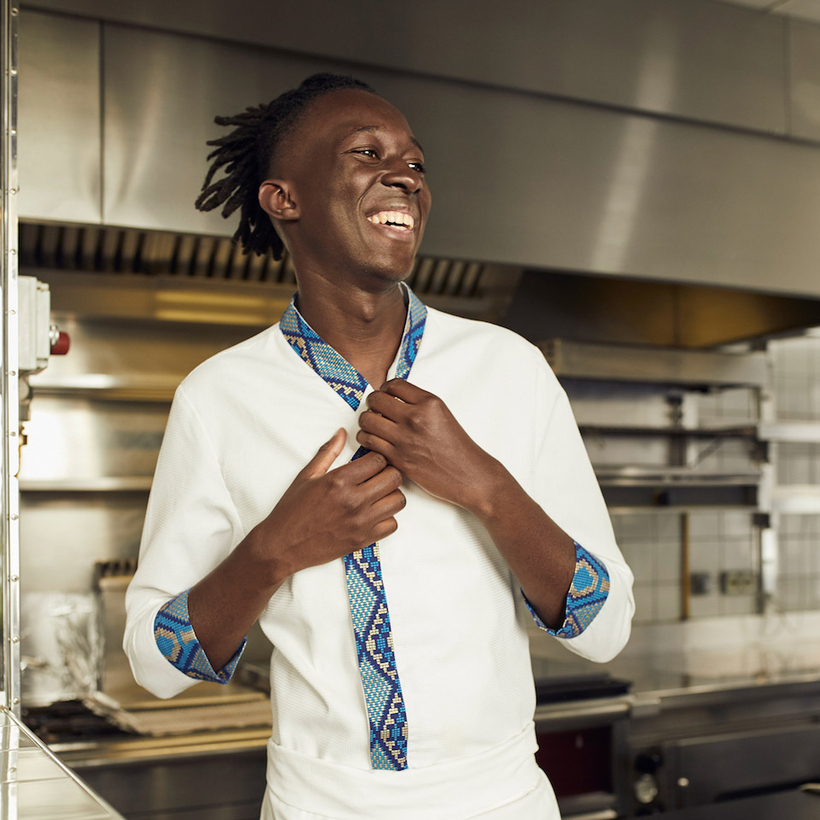It’s not only because he’s six feet, five inches tall and very telegenic that Mory Sacko is the most prominent new face of French cuisine. First, there’s all the fuss about MoSuke, his Franco-African-Japanese restaurant in Paris that earned the 28-year-old chef his first Michelin star in January. Then there’s the Young Chef of the Year, which Michelin anointed him with this month. And on February 28, Sacko made his television debut as the host of Cuisine Ouverte (Open Kitchen), an excellent new series on France 3 that explores the country’s mythic terroirs, or unique and deliciously distinctive gastronomic conditions, through their chefs and produce.
“Cuisine Ouverte is about discovering the gastronomic richness of our country and its regions, and viewing them in a new light,” explains the very tall, slender, dreadlocked Sacko, a native-born Frenchman whose parents emigrated from Mali.
In the debut episode, Sacko visited the lush Alpine resort of Megève, where the star ingredient is Reblochon, an emblematic Savoyard cheese made with unpasteurized cow’s milk. Using this cheese, Michelin three-star chef Emmanuel Renaut, of the restaurant Flocons de Sel, prepared Sacko a croûte de montagne, which just might be the most luxurious grilled-cheese sandwich you’ve ever seen (sautéed onions, two types of cheese, including Reblochon, and white wine).
Next it was Sacko’s turn, and he smoked the cheese in hay, then liquefied it with sautéed potatoes and onions seasoned with wasabi, and served the mixture siphoned inside of deep-fried spheres of toasted bread crumbs posed in sunny yellow pools of beaten egg yolk seasoned with Japanese plum vinegar. “Very unusual,” commented Renaut upon tasting Sacko’s dish. “I was afraid the wasabi would overwhelm the cheese, but it wakes it up.”
Sacko grew up in the western suburbs of Paris, with his eight siblings eating West African dishes such as thieboudienne, fried stuffed fish in a tomato-and-vegetable sauce served with rice. As a child, his idea of a meal out was American fast food. Was casting him as an authority on French cooking intended as a sociological provocation?

When asked the question, the perennially poised chef demurs. “Our show holds up a mirror to the France of today, which is a country where people from different faiths and ethnicities see themselves as French. There’s not the same psychological ghettoization here that exists in some other countries,” he says. “This is true in the kitchen, too,” he adds. “I have three cultures: the Africa of my ancestors; France, where I was born; and Japan, which speaks to my soul. All of these kitchens are present in my cooking. What I do isn’t fusion cooking, though. It’s a cuisine of resonances, since I love the way different flavors and textures interact to create an intriguing gastronomic tension in a dish.”
The prickly American concept of culinary cultural appropriation makes no sense to him, either. “Couscous is one of the Top 10 favorite dishes in France today, and that’s a good thing,” says the chef. “For me, when white French people start cooking African food, it will mean that we’ve been completely accepted as French, and this same story plays out in so many other countries.”
“There’s not the same psychological ghettoization here that exists in some other countries.”
Entranced by the world of grand hotels and elegant restaurants he knew only from television, Sacko went to hotel school when he was 15 and eventually landed at job at the Hotel Le Royal Monceau, in Paris. But it was while working as a sous-chef to chef Thierry Marx, at the two-Michelin-star restaurant Sur Mesure, at the Mandarin Oriental hotel in Paris, that his own cooking style began to evolve.
And Marx, a Frenchman of Polish-Jewish origins from the old, working-class Paris neighborhood of Belleville and an ardent Japanophile, became Sacko’s mentor.
“Even though I’ve never been, I’ve always been attracted by the subtlety, order, and beauty of Japan,” says Sacko. “And when I finally discovered Japanese food, it made perfect sense to me, because African and Japanese cooking both prize umami.”
The name of his new restaurant reflects this passion, too, since it’s an amalgam of his own first name with that of Yasuke, the first and only African samurai, who lived in 16th-century Kyoto.
“There’s a big gastronomic romance between France and Japan, because the two countries recognize themselves in each other. I’m part of this story, too, but my imagination is free, and with my knowledge of African cooking and ingredients, I can shake things up,” says Sacko. “It’s a beautiful place to be.”
Alexander Lobrano is a writer and restaurant critic. His latest book, the gastronomic coming-of-age story My Place at the Table, will be published in June

